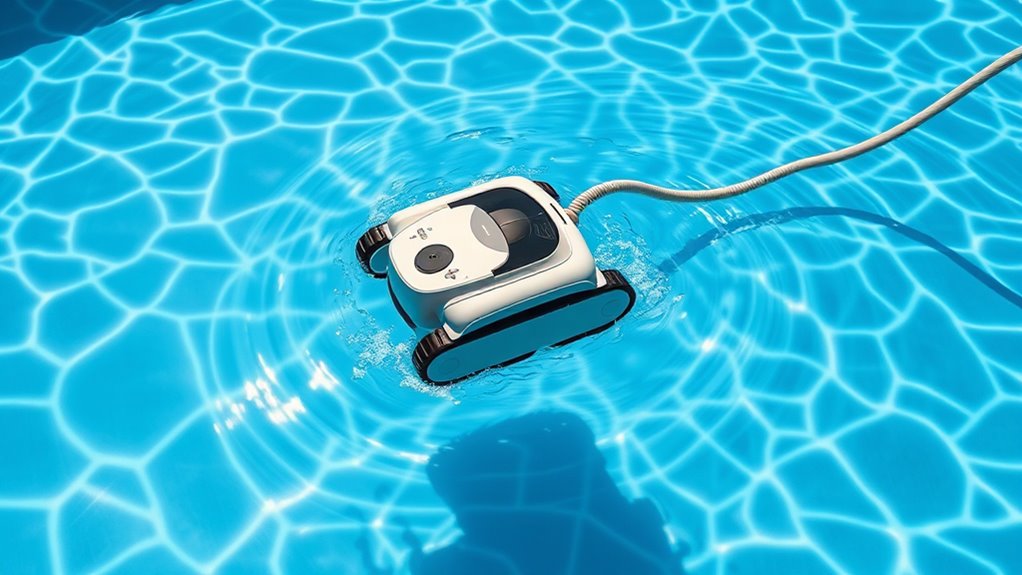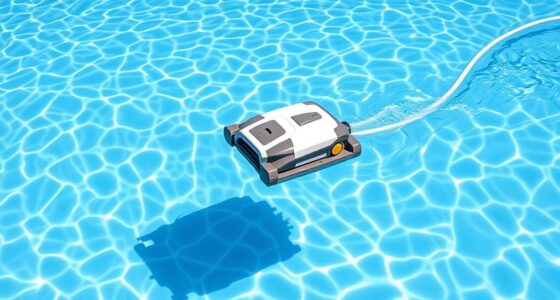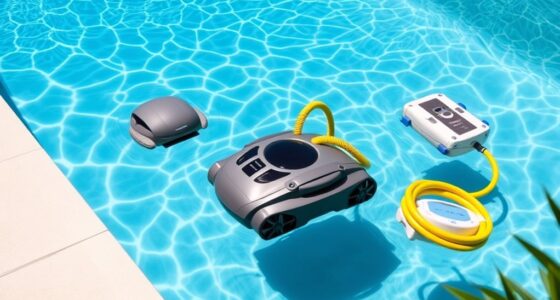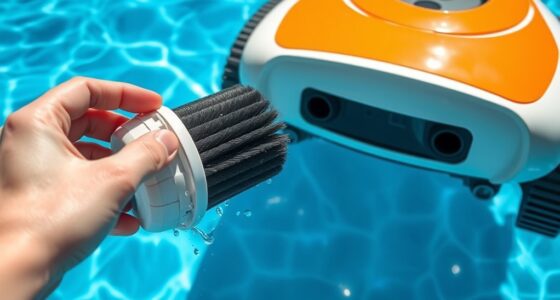Automatic pool cleaners improve circulation by actively moving water, reaching tricky spots like corners and steps. This continuous movement helps distribute chemicals evenly, preventing imbalances and promoting clearer, safer water. They also reduce algae and bacteria growth by keeping the water flowing and debris-free. Different types, such as robotic or pressure cleaners, offer various benefits for water quality. To learn how to maximize these benefits, keep exploring these effective pool maintenance strategies.
Key Takeaways
- Automatic pool cleaners enhance water movement, reaching hard-to-access areas for thorough circulation.
- They promote even chemical distribution, maintaining balanced pH levels and preventing localized imbalances.
- Continuous movement discourages algae and bacteria growth, supporting effective sanitation.
- They assist filtration systems in removing debris, dirt, and organic matter, improving water clarity.
- Regular cleaning and circulation prevent stagnation, ensuring a healthier, safer pool environment.
How Automatic Pool Cleaners Enhance Water Circulation
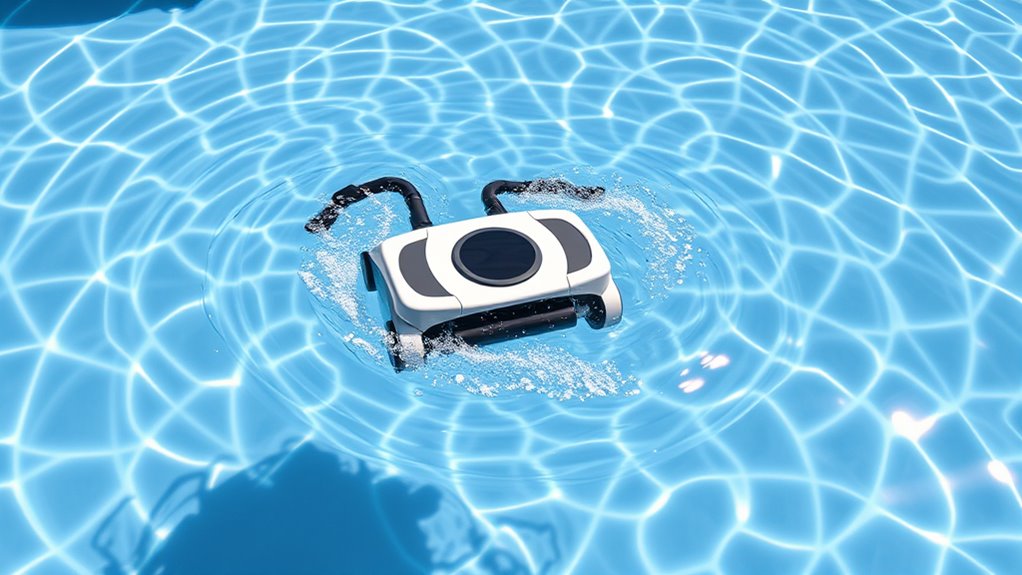
Automatic pool cleaners play an essential role in improving water circulation, especially in hard-to-reach areas of your pool. The size of your pool influences how well circulation occurs, and a cleaner helps guarantee even water movement regardless of pool dimensions. By consistently cleaning your pool according to a set schedule, you prevent debris buildup that can block water flow. Regular operation of an automatic cleaner promotes better circulation by moving water more efficiently through the entire pool, including corners and steps that are difficult to reach manually. This continuous movement helps distribute chemicals evenly and prevents stagnation. Ultimately, proper circulation maintained by your pool cleaner keeps your water clear, healthy, and inviting, no matter the size of your pool or cleaning routine.
The Role of Pool Cleaners in Preventing Stagnant Water

Automatic pool cleaners help keep your water moving, preventing areas from becoming still and dull. By promoting circulation, they reduce the chances of stagnation and bacterial growth. This keeps your pool cleaner, safer, and more inviting for swimmers.
Promoting Water Movement
Because stagnant water can lead to algae growth and bacteria buildup, pool cleaners play a crucial role in keeping water moving. By actively circulating water, they help prevent dangerous zones where algae and bacteria can thrive, ensuring better pool safety for swimmers. Automated cleaners enhance water movement without requiring much effort from you, making maintenance easier and more reliable. Additionally, these cleaners are designed for energy efficiency, using minimal power while still promoting thorough circulation. This not only reduces your energy costs but also supports eco-friendly pool management. When water flows consistently, it minimizes dead spots and improves filtration, leading to clearer, healthier water. Proper circulation also contributes to water quality improvement by supporting overall water quality in the pool environment. Regular use of automatic pool cleaners ensures continuous water circulation, which is vital for maintaining a healthy and inviting pool. Overall, automatic pool cleaners are essential for maintaining ideal water movement, safeguarding your pool, and saving you money.
Reducing Stagnation Risks
Stagnant water creates ideal conditions for algae and bacteria to flourish, posing health risks and increasing maintenance efforts. When your outdoor pool isn’t properly circulated, harmful organisms can settle and grow, especially if the pool water temperature rises. Automatic pool cleaners help prevent stagnation by continuously moving water, ensuring fresh circulation throughout the pool. This is particularly important in outdoor pool locations, where environmental factors like wind and debris can cause uneven water flow. With consistent movement, you reduce the chances of dead zones and bacterial growth. Additionally, maintaining proper water circulation is crucial for optimizing filtration and chemical distribution, further enhancing water quality. Proper water flow also helps distribute sanitizers evenly, making treatment more effective and reducing the need for chemical overuse.
Types of Automatic Pool Cleaners and Their Impact on Water Quality
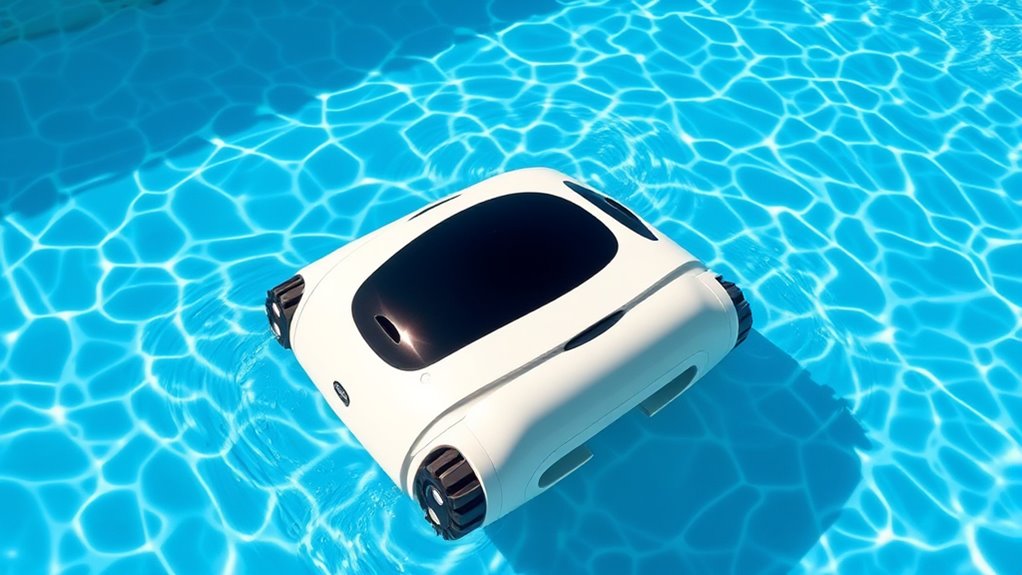
Choosing between robotic and pressure pool cleaners can substantially affect your water’s clarity. Robotic cleaners typically do a thorough job, helping keep your water sparkling clean. Pressure cleaners may be faster but might not impact water quality as effectively. Recognizing water circulation can also guide you in making choices that align with your personal growth and harmony. Proper circulation promotes even distribution of chemicals and prevents stagnant areas, further enhancing water quality. Additionally, optimal angles for pool equipment can influence how well the cleaner performs and how evenly the water circulates throughout the pool. Understanding fathers’ influence can help you select equipment that aligns with your goals for a well-maintained and healthy pool environment. Regular maintenance and understanding the effectiveness of eye patches can also contribute to a more relaxed and enjoyable pool experience.
Robotic vs. Pressure Cleaners
Robotic and pressure pool cleaners each offer distinct advantages that impact water quality differently. Robotic cleaners are highly energy-efficient, using less power and requiring minimal maintenance, which can lower overall costs. They operate independently of your pool’s pump system, allowing for more precise cleaning and better circulation, which helps improve water quality. Floating on Water is a common phenomenon in pools, and effective circulation from these cleaners can help prevent stagnation and algae growth. Pressure cleaners, on the other hand, rely on your pool’s existing pump and generate strong jets to scrub surfaces effectively. While they might consume more energy and have higher maintenance costs, they’re often faster at covering larger areas.
- Robotic cleaners are quieter and more efficient.
- Pressure cleaners can be more cost-effective upfront.
- Energy efficiency and maintenance costs influence your long-term satisfaction.
Impact on Water Clarity
The type of automatic pool cleaner you select can considerably influence your water’s clarity. A cleaner that effectively removes debris keeps your pool cleaner, reducing cloudiness caused by organic waste. Robotic cleaners excel at thorough cleaning, which helps maintain ideal pool chemistry by minimizing contaminants that can cause algae growth and water cloudiness. Pressure cleaners also contribute by circulating water efficiently, enhancing skimmer efficiency and ensuring debris is collected promptly. Proper circulation prevents stagnation and helps distribute chemicals evenly, improving water clarity. When your pool’s water stays clear, it’s easier to monitor and maintain the correct pool chemistry, reducing the need for chemical adjustments. Additionally, automatic pool cleaner maintenance plays a crucial role in ensuring the equipment functions optimally, supporting clearer water and healthier pool conditions. Overall, choosing the right cleaner supports clearer water, healthier pool conditions, and a more inviting swimming environment.
Improving Chemical Distribution With Automated Cleaning Devices
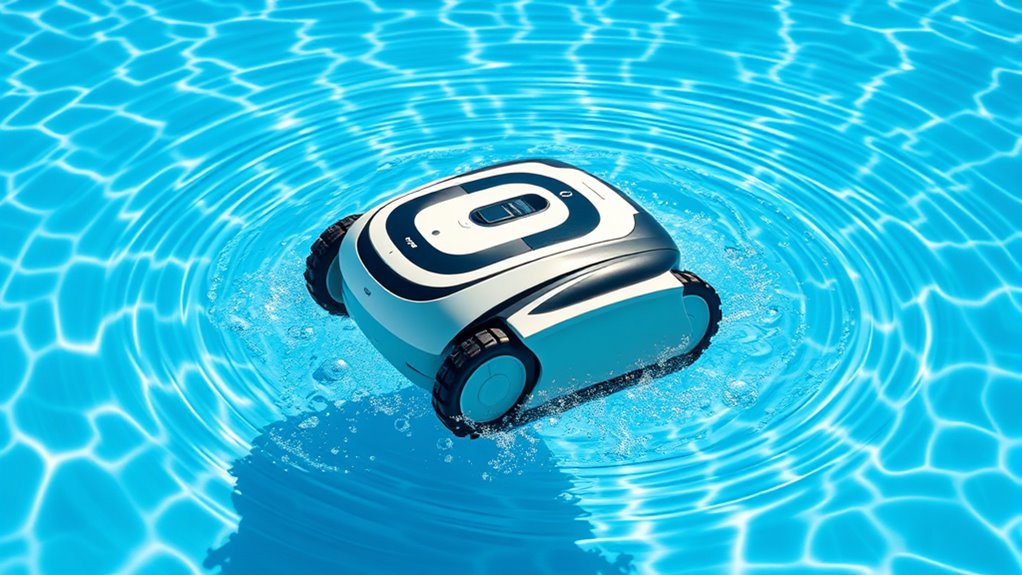
Automated pool cleaners play a crucial role in enhancing the distribution of chemicals throughout your swimming pool. They help guarantee even chemical mixing and maintain proper pH balancing, which is essential for water quality. By continuously circulating water, these devices prevent stagnant zones where chemicals may not reach efficiently. This improved circulation promotes uniform chemical dispersion, reducing the risk of algae growth and bacteria buildup. Additionally, incorporating electric pool cleaning devices can improve energy efficiency and reduce manual labor involved in pool maintenance. Proper operation and regular maintenance of these cleaners further ensure optimal water circulation and chemical distribution. To maximize benefits, consider how your cleaner:
Automated pool cleaners ensure even chemical distribution and improve water circulation for a safer, cleaner pool.
- Promotes thorough chemical mixing for consistent water treatment
- Aids in maintaining stable pH levels by preventing localized imbalances
- Supports overall water clarity through better circulation
With regular use, automated cleaners keep your pool’s chemicals evenly distributed, making water safer and more inviting.
Benefits of Consistent Pool Maintenance for Water Clarity
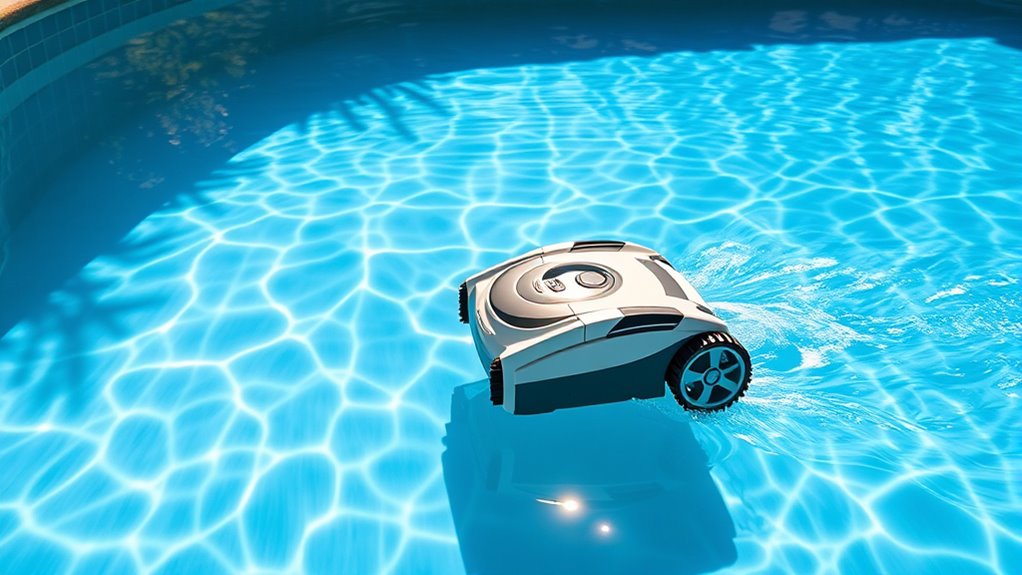
Maintaining a consistent pool maintenance routine considerably enhances water clarity by making certain that chemicals are properly balanced and contaminants are regularly removed. Regular pool maintenance keeps algae, dirt, and debris at bay, preventing cloudiness and murkiness. Effective water filtration is essential in this process, as it traps particles and keeps the water clean and clear. When you stick to a routine, you reduce the risk of chemical imbalances that can lead to cloudy water or algae growth. Automated pool cleaners considerably support this effort by continuously circulating and filtering the water, making maintenance easier and more effective. Additionally, understanding pool filtration systems can help in optimizing water circulation and clarity. A strong understanding of interior design basics can also help in choosing optimal pool features and accessories that promote better circulation. Consistency in your pool upkeep ensures the water remains inviting, safe, and visually appealing all season long.
How Pool Cleaners Help Reduce Algae and Bacterial Growth

Since algae and bacteria thrive in stagnant or poorly circulated water, pool cleaners play an essential role in preventing their growth. By continuously moving water and debris, they help maintain a cleaner environment where harmful organisms struggle to establish themselves. This active circulation supports your pool sanitizer’s effectiveness, reducing the need for excessive chemical treatments. Regular cleaning disrupts algae prevention efforts by removing organic buildup and preventing spots where bacteria can grow. Additionally, effective circulation can help optimize filtration systems, leading to overall improved water quality. Proper circulation also ensures that chemical distribution is uniform throughout the pool, enhancing sanitation efficiency. Maintaining proper water flow encourages natural microbial balance, which can further inhibit unwanted bacterial growth. Incorporating consistent maintenance routines with your pool cleaner can further promote water clarity and safety, making your swimming experience more enjoyable. Using a reliable automatic pool cleaner ensures continuous water movement and debris removal, which is vital for long-term water health. With consistent use, your pool cleaner helps keep algae and bacteria levels down, ensuring safer, clearer water for you to enjoy.
Tips for Maximizing the Effectiveness of Automatic Pool Cleaners

To get the most out of your automatic pool cleaner, it’s vital to optimize its setup and operation. Regular pool cover maintenance prevents debris buildup that can hinder cleaning efficiency. Keep the skimmer basket clean to guarantee proper water flow and debris removal. Adjust the cleaner’s settings for your pool size and shape, and make sure it covers all areas evenly.
| Tip | Benefit |
|---|---|
| Clean the skimmer basket | Maintains ideal water flow and debris removal |
| Maintain pool cover | Reduces debris entering the pool |
| Check cleaner settings | Ensures thorough cleaning of all pool areas |
Frequently Asked Questions
How Often Should Automatic Pool Cleaners Be Serviced?
You should service your automatic pool cleaner at least once every three to four months. Follow a regular maintenance schedule to keep it running smoothly. Check for debris, clean filters, and inspect hoses often. Service tips include rinsing parts after use and replacing worn components promptly. Proper maintenance ensures ideal pool circulation and water quality, preventing breakdowns and extending the cleaner’s lifespan.
Do All Pool Cleaners Work Effectively in Large Pools?
Think of your pool as the ocean—some cleaners are like tiny boats, great for small lakes but struggling in vast waters. Not all pool cleaners work effectively in large pools; their cleaning efficiency depends on pool size. For bigger pools, you need a robust, high-capacity cleaner that can cover more ground quickly. Otherwise, you risk uneven cleaning and poor water circulation, which can compromise water quality.
Can Automatic Cleaners Remove Fine Debris and Algae?
Automatic pool cleaners can effectively remove fine debris and algae, especially models designed for detailed cleaning. You’ll notice they pick up dirt, leaves, and even small particles that manual cleaning might miss. While some cleaners excel at algae removal, you may need to pre-treat your pool with algaecide for best results. Overall, automatic cleaners help keep your pool water clear and healthy by consistently tackling fine debris and algae buildup.
Are There Energy-Efficient Options Available for Pool Cleaning Devices?
Imagine a cleaner gliding effortlessly across your pool, saving energy while keeping water sparkling. Yes, there are energy-efficient models and eco-friendly options available that cut down power use without sacrificing performance. These advanced devices use smart technology to optimize cleaning cycles, reduce electricity bills, and minimize environmental impact. You can enjoy a pristine pool, knowing you’re making a responsible choice for both your backyard and the planet.
How Do Automatic Pool Cleaners Affect Pool Pump Lifespan?
Automatic pool cleaners can extend your pool pump’s lifespan by reducing strain through cleaner compatibility and better circulation. When you choose the right cleaner, it minimizes the workload on your pump, lowering the need for frequent pool pump maintenance. Properly maintained cleaners work efficiently, helping your pump operate smoothly longer. This synergy ensures your pool stays clean and your equipment stays in good shape, saving you money and effort over time.
Conclusion
Using an automatic pool cleaner isn’t just about convenience—it’s a smart way to improve circulation and water quality. Did you know that pools with regular automated cleaning see up to 50% less algae growth? By keeping your water moving and evenly distributing chemicals, you create a healthier, clearer swimming environment. Make the most of your cleaner’s features, and enjoy a sparkling, inviting pool all season long.
